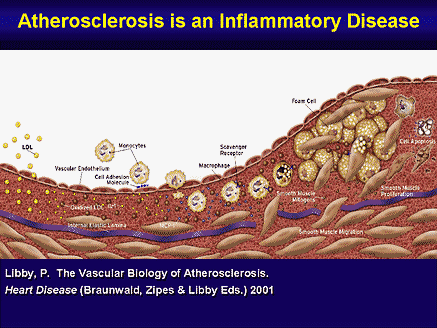You already understand that hypertension, raised cholesterol, and specific way of life elements, such as poor diet, absence of workout, and cigarette smoking, are major risk factors for heart problem. However science reveals there's another element that could impact your heart health. Research study performed at Brigham and Women's Hospital (BWH) over the previous 20 years suggests that swelling likewise may contribute to heart problem threat.
Little Known Questions About Inflammation.
Swelling also may occur in response to the buildup of fatty deposits (atherosclerosis) inside the walls of arteries, potentially causing the development of damaging embolism. In 1997, researchers led by Dr. Paul Ridker, Director of the BWH Center for Cardiovascular Disease Avoidance, discovered that middle-aged men with greater blood levels of C-reactive protein (CRP), a procedure of inflammation, were at increased threat of having a cardiac arrest or stroke in the future.
Ridker's team made this discovery while studying aspirin, an anti-inflammatory drug. His team concluded that the advantage of being on aspirin for cardiovascular disease avoidance was higher for people who had greater levels of inflammation than those who did not. Dr. Ridker and coworkers went on to study whether statins, cholesterol-lowering drugs, also could lower swelling.
Inflammation Fundamentals Explained
Based on these findings, Dr. Ridker's group has launched 2 additional medical trials to study the relationship in between heart problem and swelling: Cardiovascular Swelling Reduction Trial (CIRT)-- studying whether low-dose methotrexate, an immunosuppressant, will decrease rates of myocardial infarction, stroke, and cardiovascular death among stable coronary artery illness clients with type 2 diabetes or metabolic syndrome.
Dr. Ridker mentions that workout and eating a diet rich in foods such as entire grains, fish, extra virgin olive oil, and nuts likewise can decrease inflammation.
Excitement About Reducing Risk Of Heart Disease
With the greatest quality of look after our clients with inflammatory heart problem, our heart specialists have the experience to deal with the most complicated issues. University Hospitals Harrington Heart & Vascular Institute supplies the needed treatment to eliminate the hidden infection, restore healthy heart rhythm and flow, relieve symptoms and minimize long-term damage to the heart.
Such an infection can trigger damage to or inflammation of the lining of the heart, valves, outer membrane or the heart muscle itself. The signs you may face depend upon the kind of heart infection and can consist of shortness of breath, chest discomfort, heart palpitations, tiredness, fainting, aching muscles, red areas under the fingernails and purple or red areas on the skin.
Heart Disease Fundamentals Explained
It must be treated right away so that it doesn't turn into a deadly condition. It usually takes place when bacteria travel through your blood stream to your heart and connect to damaged heart tissue. Myocarditis: Myocarditis is an unusual condition that is caused by a read more viral infection or autoimmune action and leads to inflammation and damage of the heart muscle.

This heart infection can emerge after a cardiovascular disease or heart surgical treatment or since of an inflammatory autoimmune condition such as arthritis. The type of heart infection you have as well as its cause will determine how our heart experts identify treatment. Prescription antibiotics, medications for cardiac arrest, corticosteroids and drugs that lower swelling can typically deal with small inflammatory heart problem.
Unknown Facts About Heart Disease
You'll be linked to a maker that draws blood supply through a special membrane. It will add oxygen, get rid of co2 and serve as an external heart so that your heart can rest and heal. Heart transplant: A heart transplant may be a viable treatment option if there has been severe damage to your heart that can not be reversed.
Pericardiocentesis: This procedure uses a needle to remove excess fluid from the pericardium. It may be an option if you have severe pericarditis and an excessive amount of fluid buildup around your heart. There are certain lifestyle choices that can help you avoid inflammatory heart problem and the threats of heart click here damage associated with it.

4 Easy Facts About Stopping Inflammation Shown
INTRODUCTIONCardiovascular diseases (CVD) encompass numerous entities such as coronary artery disease, cerebrovascular occasions, peripheral arterial disease, kidney artery stenosis and aortic aneurysm. CVD are globally the leading cause of death [1] Coronary artery illness and stroke are the cause of 80% of CVD deaths in males and 75% in women [1] One significant event underlying the advancement of a CVD is the presence of atheromatosis where cholesterol is indisputably acknowledged as an environmental and hereditary motorist of the disease [2]


If we search Club Medication using both "inflammation" and "atherosclerosis" as essential words, we can see an expediential boost of the variety of posts on the subject: from around 80 articles found over a whole 20-years duration between 1970 and 1990 to more than 12000 new publications considering that 2010. Nevertheless, work by scientists and scholars have actually taught us that "arteriosclerosis", swelling and their in-between link had actually emerged over 200 years ago, as a long standing clinical conversation that actually developed in active argument with famous doctor Rudolph Virchow as a strong supporter in favor of the substantial role of the inflammatory process [4]